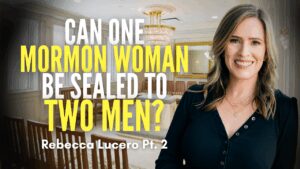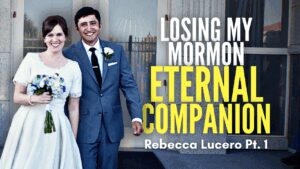Continuing our series on “Losing the Lamanites,” we interview Sarah Newcomb who descends from the Tsimshian of the NW Coastal Tribes. In this interview we cover:
- How Sarah struggled as a youth knowing that she came from the ‘Lamanites,’ who had turned their backs on God.
- How she worked her way through college in Rexburg, ID, acquired a degree in Communications/Journalism, and how her new knowledge around sourcing served as an impetus to her questioning her faith.
- How her husband ignored the Mormon admonition against interracial marriage, out of love for Sarah.
- Her avoidance of dancing (and other native customs), as they were practiced by the ’Lamanites’ in the Book of Mormon.
- Her avoidance of the sun, as a way to ensure that her skin would stay as light as possible.
- How she used her knowledge of sourcing (seeking original documentation) to discover many of the problems with LDS church history and doctrine, all before discovering the CES Letter.
- How Mormon Stories Podcast validated her feelings, and provided strength and a sense of community during her faith transition.
- How she now embraces her life in the sun, and is on a journey to connect to the heritage and identity she felt forced to distance herself from while a member of the LDS Church.
We thank Sarah for sharing her powerful, beautiful story and know that it will touch lives!




11 Responses
Thank you, Sara, for sharing your very powerful and emotional story. I don’t think most white Mormons really understand what it must feel like for people of color to grow up in a belief system that so consistently and thoroughly denigrates those who are not white; not necessarily in any overt way, but just by the fact that racism is baked into the theology at the foundational level. The Book of Mormon is based on the “white and delightsome; dark and loathsome” dualism and there’s really no way for the church to gracefully change that given the bedrock status of the text.
Mormonism, for me, was obviously created by 19th century American white people who infused the religion with all the biases, prejudices and blatant ignorance of the times. Yet this obvious truth remains hidden for many. Hopefully, your story will help many others see the truth that blinds them at the present moment.
So I see “Lamanite,” and then I see Sarah before I know the details, and I’m wondering Hawaiian? Maori? Polynesian? And then I’m a little surprised at ‘Native American.’ And then I keep watching and thinking Sarah could also easily be Latino or Mediterranean.
And then I wonder–regardless–how possibly and why could it make a negative difference to the family of a date, or to potential spouse or in-laws? Or to a ward???
Because she’s absolutely drop-dead gorgeous but, more importantly, she has such a good and beautiful heart and mind, and she’s so genuine, wise, smart and savvy. It’s almost unimaginable to me that people could believe and act that way. And, from my days as a Mormon years ago, I was totally unaware that kind of prejudicial garbage existed among Mormon members against “Lamanites.” And yet I’m fully aware of the deep and long-standing cultural and religious racism against blacks that existed in Mormonism (and still persists for some 39 years later). Both were “cursed” but for some reason I still didn’t make that association, or the racism, with modern “Lamanites.”
Until now, with only casual exposure, for some reason I was thinking that for believing “Lamanites” it had always been a source of pride and identity. And that it had been painful for them to lose that ‘special’ status. So I was probably conflating what I understood of some Polynesians and losing their Hagoth heritage & identity with the Lamanite experience.
It’s too bad Mormonism can’t just divorce itself entirely from the Book of Mormon –– an obviously contrived 19th century protestant Christian invention. And also the nonsense of patriarchal blessings and the Ephraim & Manasseh silliness.
Good luck in reclaiming your extended family and your “Native American” identity and pride, Sarah.
What a great story and interview and person. Best wishes… loved your story and happy for you. Enjoy the light. And the Sun : )
Thank you sarah for your beautiful and moving story, l feel that all this information is so important for us to know and understand because it is the Mormon heritage, but, l personally do believe that joseph does have a big part to play in the beginnings of Mormonism as does brigham young because they started the movement so they must have know where they wanted it to go and the falsehoods that came with it along the way, l think joseph had it in mind to want to attempt to change the world and to get rid of sin, he saw a really sinful world around him and said he wanted to turn people to jesus, but he chose wrong ways to go about it by it’s foundation that it was based upon, also the awful so called revelation of plural marriage, a devastation for so many over time and that was just plainly not from god and so very wrong and damaging too, for so many women and polyandry too, thank you once again for a wonderful moving interview, god bless you sarah and your lovely family in your lives to come, thanks john.
I was deeply touched by your interview. I just wanted to hug the young girl inside of you and tell you that with time , you will heal. You are now free ! I am a third generation Mormon and a ” Lamanite”. I understand your pain and sense of loss and regrets. I decided that I was not going to allow Mormonism to define the rest of my life. I could chose to be a victim or to be victorious over the system that caused my family, so much suffering. You are still a young woman and your story is one that will be valuable in assisting others . By the way, you are beautiful inside and out!
I agree with one comment that you are “drop dead gorgeous”. I was interested when you said your mother’s family was from Metlkatla Island. The airplane ticket I still have from Seattle to Ketchikan, dated 1954, says that we landed on that island and then flew in a small plane to Ketchikan. From there my ticket on a sea plane was $11 as my parents and I flew to the commercial trolling (fishing) camp of Noyes Island.
Although I am of German and English ancestry. my skin tans very easily. After the summer in Alaska in 1954, we moved to an island in Washington and all the kids in school were of Scandinavian decent, except for a few native Americans. From the fourth grade through a lot of high school, I was called the “N” word because my skin was darker. I thought it was because we had moved from Southern California where the sun shines a lot, but my color didn’t fade. Those cutting remarks such as “There must have been a “N” behind the wood pile,” hurt me as a shy boy with no close siblings. And it didn’t help that my name had a definite Indian sound causing questions for many years.
After spending some 7 summers in Alaska on a family fishing boat, I went to college and got married. My wife is very fair-skinned but her step father is 1/4 Yakama (That means he is considered part of the tribe.) He used to talk a lot about how the Indians were treated and I, after having joined the Church, kept telling him that he was wrong because I had read [white man’s] history and knew the way it was. A few years ago after reading several books recounting Indian stories, I called him one day and apologized.
I read in a recent issue of High Country News about Native American discrimination and we don’t hear about it, but much of it is worse than the Black’s problems.
Sarah, you really need to be very proud of you heritage. I wish my dark skin meant that I was of that same culture. Thank you very much for your interview. You are a year younger than my daughter who also attended Ricks.
The Book of Mormon goes back and forth between the Lamanites turning their back on God, and then the Nephites turning their back on God. I totally understand her feeling sensitive about this topic in a way that I can’t fully understand or relate to. But for me, the Lamanites in the Book of Mormon were more inspiring and heroic than the Nephites in a lot of the messaging. The anti-nephi-lehis choosing peace over war, the bravery of the stripling warriors, Samuel, Lamoni, etc. The Book of Mormon assures that the descendants of the Lamanite Nation have a glorious future awaiting them. I feel very sad that she experienced racism from racist/ignorant Mormons. But I would like to point out that our whole society has been very racist and is evolving on the subject. I do think that the few references to the Nephites being “fair and delightsome” was probably one of the “errors of man” admittedly included in the Book of Mormon. Assuming the Nephites and Lamanites existed and had different skin tones, they were probably somewhat racist too, since there has been some form of racism in all of recorded history. It sucks and it’s wrong, but I have hope that the millennials, this current younger generation, is finally overcoming this particular form of ignorance and hatred more than their forebears were capable of. Best of luck to this beautiful young woman in her life journey.
One other thought I had after writing this, and reflecting some more. If one were to believe the Book of Mormon to be a true history, then that means God allowed the Nephites to be completely destroyed and wiped out, in part it states, because they chose wickedness and hatred and rebelled against the true light of the gospel. He had mercy on the Lamanites and “preserved their seed” because they were ultimately more righteous than the Nephites, and promised that their peoples would be brought fully into the truth of the gospel at a later date to “blossom as a rose”. So even if you think it’s all a bunch of hogwash, you’d have to admit that this “pretend” Mormon God apparently favored these more pigmented people with greater affection and love, and had greater aspirations for the Lamanites than he had for the lighter pigmented peoples. I don’t think he turned his back on the Nephites for not having enough pigment though– I think to God the pigment part must have been irrelevant, as it also affirms in the Book of Mormon that God is no respecter of persons when it comes to gender and skin tone etc, but only favors the righteous. But it does make it clear to me that He obviously did not love the Lamanites any less. There are some confusing and contradictory statements in the Book of Mormon, which one would expect in any combination of historical records written from diverse points of view (and in this case, the history was written by Nephite historians, so we would fully expect it to have a Nephite bias)–whether false or not. So for me, if you do choose to believe, it’s so important to rely on your own inner spirit and voice to discern what is nourishing and helpful vs what is biased and not helpful. Personally, I have felt blessed to have the Book of Mormon in my life even if Joseph Smith personally made it all up, because it has still made me think about pride, social justice, equity, humility and the human tendency to try to elevate ourselves over others, over meaningless and superficial things. I came from poor roots and read a study once that rich people literally tend to become selfish assholes over time (worded more politely) and as I have gained in material wealth, I have used the Book of Mormon as a reminder of the foolishness of thinking anything we have is because we are better or more deserving than others–for me that was one of the core messages of the book, and one our society desperately needs to hear more often regardless of the source.
Thank you, Sarah, for your honesty and vulnerability. Your words have made me consider things that I never before had considered.
I so enjoyed your story, Sarah! I, too, have so much regret for the way I treated my grandparents and my family of origin, once I converted to the Mormon church. My self-righteousness kept me from ever having a loving and close relationship with them. They are all dead, now…my parents and grandparents, aunts and uncles. They did not live long enough for me to apologize for my arrogant behavior. I can only say that I did what I was taught, and what I was taught was wrong. For me, the church destroyed my family ties, it did not strengthen them. I, also, understand the feeling of inferiority within the church. I knew that I had Native American, as well as African American blood. But, I kept that information to myself, until recently. Your story brought me to tears. I have felt so many of the same emotions within a religion that values whiteness and patriarchy above all else. I’m so glad that you still have family that can teach you the ways of your ancestors, and that you will be able to give your children the priceless gift of heritage. To know who we truly are, beyond other’s opinions and dogma, is one of the greatest gifts we can receive. Thank you for your vulnerability.
Rebecca,
The reason for the racism in the Book of Mormon is probably due to Joseph Smith, like many Americans in those days, being racist. For those who still believe the Book of Mormon to be true, I would advise you to read “Studies of the Book of Mormon”, by Council of Seventy member B.H. Roberts, who said that after several years of study felt that Joseph Smith could have written the BoM.
Yesterday I listened to the earlier podcast with Navajo Joe. Not long afterwards I asked a close neighbor (active LDS) what he would have said had he been a bishop and a Native American member asked him, “Why am I brown and you are white?” And he replied, “Because of what happened in the pre-existence.” I think that member like so many have been told such lies for so long that they believe such an answer is not racist because God advocated it and all the God does is good. And I know that just 6 years ago I would probably have said the same thing.
I very much enjoyed the podcasts of Joe and Sarah. The more many former Church members are away from the Church, the less anger one feels. I continued my studies of scriptures and discovered just as many errors in fundamental Christian scriptures as with Mormon ones. If there is a god, I have found absolutely no evidence of one. I’m sure we all wish we would have eternal life with our families, but just hoping something doesn’t make it true.
Good luck, Sarah and I hope many more Native Americans as well as active LDS listen to your podcast.
The evidence shows that the Book of Mormon is an ancient record (and therefore it’s true and is a powerful witness for Christ). Naturally we read it from our cultural point of view (even some church leaders) but Joseph Smith made it clear that terms such as “black”, “white”, “skins”, “washed white” in the blood of the Lamb”, garments/skins made white, and so on, were used symbolically. “Nephite”, “Lamanites”, etc. seem to be religious OR political designations. Those ancients believing in Christ were typically called Nephites, except when Nephites were not faithful (e.g. Samuel “the Lamanite” proudly Lamanite while Nephites were straying and needed Lamanite spiritual guidance-Gentiles such as John are currently in the same fallen situation as the Nephites). If we read the book with open hearts and comprehend it as the ancient record that it is, then we see things more as they are, and we will also understand the great blessings and calling given to Native Americans, as the stewards of this land. These blessings of spiritual leadership probably apply to all faithful Native Americans, wether they are descended from Lehi or not. Lehi was not white in our modern way. And, here again, it is evident that many, if not most, Native Americans are descended from Lehi. Sarah, the author of the CES letter, and many other Gentile sophists, seek to lead you from that heritage and from your sealing. Always put your faith in Christ first, and then yourself, and remember what you know deep down. Don’t trust doubtful mockers. Christ is the light whereby we are all filled with love and washed white.